IARC recently published a volume on quantitative bias modelling: Bias assessment in case–control and cohort studies for hazard identification (IARC Scientific Publication No. 171). We are pleased to see inclusion of some of the work RSI’s Drs Franco Momoli and Daniel Krewski conducted for the INTERPHONE and MOBI-Kids studies of cell phones, radiofrequencies, and brain tumours as examples in the text. The IARC publication includes several fantastic resources that epidemiologists can add to their statistical armamentarium. This entails using data external to the study to address unmeasured confounders, measurement error on variables, and issues arising from selection into and out of study populations.
These methods, while still not widely adopted, are found in several modern epidemiologic textbooks, and they deserve wider appreciation. Recommendations have been made to use quantitative bias methods to more transparently discuss study limitations, to understand the robustness of study results during journal peer review, and to properly characterize sources of systematic bias in regulatory contexts. The first step is often planning for this work at the grant funding stage.
Work conducted by Risk Sciences International for Health Canada has also involved these approaches with benchmark dose modelling leading to deriving health-based regulatory values for drinking water and air quality. These methods typically use high quality key epidemiologic studies that, nevertheless, had limitations that deserve quantitative characterization of uncertainty.
Experts related to this news item
More RSI News
RSI Helps Strengthen Food Safety Culture in Vietnam
In mid-October 2025, Vietnamese and Canadian experts convened in Đà Nẵng to exchange approaches for strengthening food safety through risk science. The workshop brought together…
Read News ItemUse of Probabilistic Exposure Models in the Assessment of Dietary Exposure to Chemicals
Risk Sciences International CEO, Greg Paoli and RSI senior experts Emma Hartnett and Paul Price, have co-authored a new peer-reviewed publication highlighting the critical role…
Read News ItemAging and cognitive decline
Working with the College of Physicians and Surgeons of Alberta, Risk Sciences International conducted a wide-ranging review of aging and cognitive decline, with specific focus on aging physicians and fitness to practice. The publication in Aging & Mental Health documents domains of cognition that decline with older age, concerns with relying on physician self-reported competency, challenges with cognitive screening in older physicians, and a general data gap linking cognitive levels and fitness to practice.
Read News ItemEvidence-based Risk Assessment Framework
Working with international thought leaders in risk science, Risk Sciences International investigators contributed to the development of the evidenced-based risk assessment framework shown in the…
Read News Item

